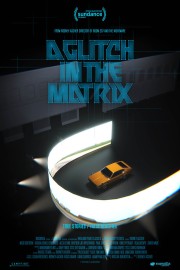A Glitch in the Matrix
**Seen at the 2021 Sundance Film Festival.
As much as I adore “The Shining” as a film, I’m only mildly fascinated by Rodney Ascher’s non-fiction debut, “Room 237”- part of that is because it’s little more than a glorified YouTube video that happened to get a theatrical release. When I saw the description for his latest film, “A Glitch in the Matrix,” I was intrigued, but couldn’t help but go into the film with a healthy bit of skepticism, not having been impressed with his approach in the earlier film. Some of Ascher’s stylistic ideas from that film remain in this one, but part of the reason “A Glitch in the Matrix” works is that it gives itself over completely to exploring a single theory from several angles, rather than cramming as many theories into a single film. The result still could have gone off the rails into “glorified YouTube video,” but it is much more assured as a cinematic work, a speculative documentary worth speculating about.
We live in complicated times. That is always true, of course, but it feels as though it is more true now than ever. A large part of that is because it doesn’t feel as though we all live in a shared reality anymore. In a way, that’s been true since the beginning of the major religions, and the ways they view life, and especially death, but in an era of cries of “fake news,” and significant portions of the population believing in conspiracy theories about demons and Satan-worship, and a world where profound truths have been hidden from all of us, our sense of a shared physical reality is more tenuous than ever. In “A Glitch in the Matrix,” Ascher sets out to explore one, such idea of reality known as Simulation Theory, which simply states that we are not living in a free world, but part of a simulation run by a higher form of intelligence. Of course, it is not as simple as that, but Simulation Theory makes us ponder a terrifying prospect that free will is, truly, an illusion, and we simply exist in our day-to-day lives at the whims of a higher power. That the theory has taken off in the 21 years since “The Matrix” is hardly surprising, although it was not the first piece of science fiction to pose the idea.
Ascher builds his film in sections, starting each section by looking at the writings of Phillip K. Dick, and in particular, a 1977 speech he gave where he posed the idea of us living in a simulated world. More than any other great sci-fi author, Dick’s visions of the world, and technology, have become more and more our reality, and Ascher uses comparisons with many of the films that have been born out of Dick’s work (like “Minority Report,” “Blade Runner,” “Total Recall,” “A Scanner Darkly” and even “Imposter”), and things about our current existence like Elon Musk’s hopes for colonization on Mars, the surveillance state, and other technological truths of our current time and place to make his case for Dick as a full-out visionary who saw where the world was headed.
“A Glitch in the Matrix” is still a pretty low-tech film for Ascher in terms of his technical skills- he uses digital avatars in place of his primary interview subjects, and they look like early CGI graphic renderings, but when they are telling of moments they felt as though they were living in a simulation, or sensed a lack of reality to their lives, the visuals are more sophisticated, which goes for the film itself. There are some compelling ideas here about how media has warped our perception of the real world, and how people interact with it, but the film does also acknowledge, in ways, that that road can lead to a darker place. The best illustration of that point is one of Ascher’s primary interview subjects- Joshua Cooke. In 2003, he was a Virginia teenager completely engrossed with the ideas of “The Matrix,” and that the world he lived in was not his own, so much so that, one day, he took a shotgun, and killed his parents. His lawyers tried to plead insanity using what is known as “The Matrix Defense,” but Cooke refused, and pled guilty- he is now serving a 40-year prison sentence. His words in the last third of “A Glitch in the Matrix” are chilling, and bracing, and Ascher’s way of showing the darker side of belief in simulation theory. It’s a warning to us all to not get sucked down that rabbit hole too much- we may lose our ability to relate to reality in a healthy, humane way. In the end, that being the thing we take from this film is probably better than anything else in the film.










